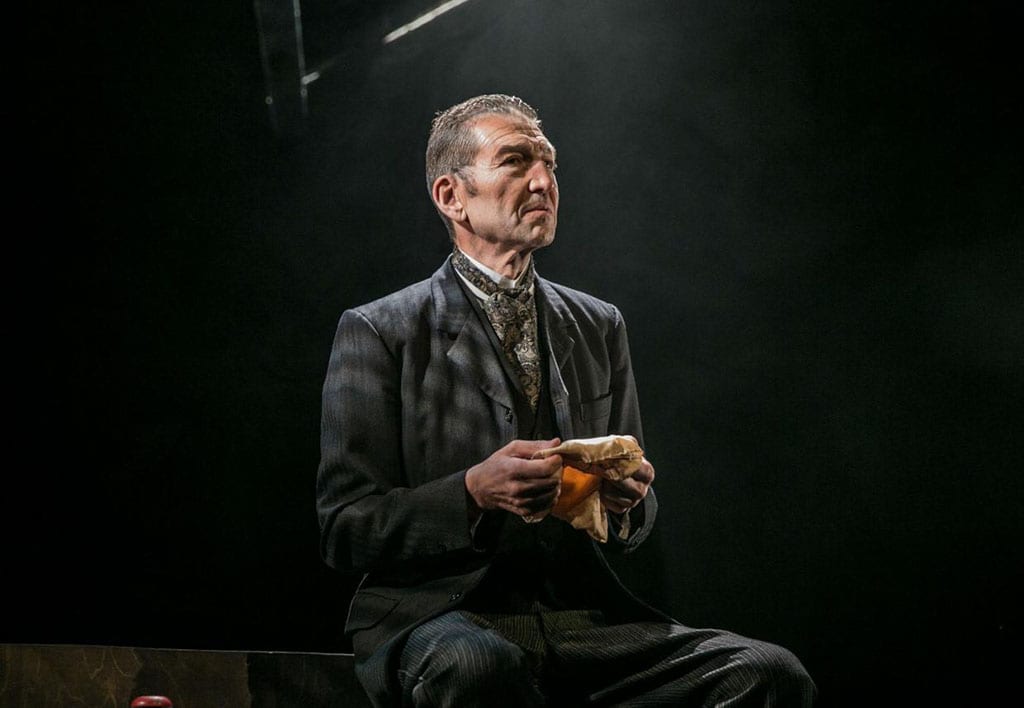There is a lot more to Tolstoy’s literary output than simply War & Peace and Anna Karenina. Those great masterpieces – and their adaptations – have eclipsed the fact that in later life he carried on writing, and not just increasingly cranky pamphlets either. His novella The Kreutzer Sonata dates from the late 1880s, and is quite as brilliantly written as the earlier works, with psychological penetration and insight as acute as ever, and content and tone remain as controversial and edgy to this day as they seemed on first publication.
This is the tale of Pozdnyshev (Greg Hicks). It begins, like so many Russian stories of the nineteenth century on a long railway journey. This is only hinted at here by a couple of basic benches and occasional railway references on the soundtrack He is a man in an ill-fitting, shabby suit, and we soon learn that the reason for this is that he is returning from serving time in jail. He is on the face of it an ordinary man, but as he begins to explain how his world has collapsed we find he is far from ordinary. It is the tale of an abusive and unhappy marriage, told from his own angle, but where the beautifully observed detail brings his wife’s plangent perspective to life equally well. The narrator offers a forensic but simultaneously narcissist dismantling of conventional bourgeois morality, and a ruthless exposition of male sexual jealousy – in this case of an old acquaintance, now a talented violinist, who starts to make music with his wife, an able amateur pianist.
To make all the levels of this story work on stage away from the private imaginative engagement between author and reader requires acting of real and rare skill: without that the story could easily lapse back into the framework of a cheap and two-dimensional contemporary melodrama. Hicks draws us into the compelling, if unappealing, world of Pozdnyshev, not through bluster, but by a shrewd logic patiently developed, and a tone alternately confiding and pleading – just the kind of conversation, in fact, that we have all experienced with a stranger in a railway carriage at some point in time. We are taken into the febrile mental world of the character and such is the power of the performance that disbelief is suspended for the duration.
Alongside the human trajectory of the story is a fascinating dialectic on the power and allure of music. Pozdnyshev both does not understand music, while appreciating and detesting its emotive power: it is part of the jealousy he experiences of what his wife and his former friend share that excludes him. What is less well known is that Tolstoy himself always imagined this work brought to life with musical accompaniment. It was therefore an inspired idea on the part of adaptor Nancy Harris to place the single actor on stage with a pianist (Alice Pinto) and violinist (Phillip Granell) as well, both of them in period costume on a dais behind him. They do not simply play the Beethoven, but also provide an effective underscore to the text at different points, both sinister and sympathetic, all from the protagonist’s perspective.
This is a wholly compelling evening that held its audience in rapt concentration for 95 minutes. Everyone around me sighed audibly with relief as it ended, but only because of the tension and strain of attending to such an unsettling and destabilising work of art that requires concentration on so many levels. As TS Eliot wrote, ‘Humankind cannot bear much reality’. All the same, any serious theatre-goer needs to make time to include this show in their schedule.

